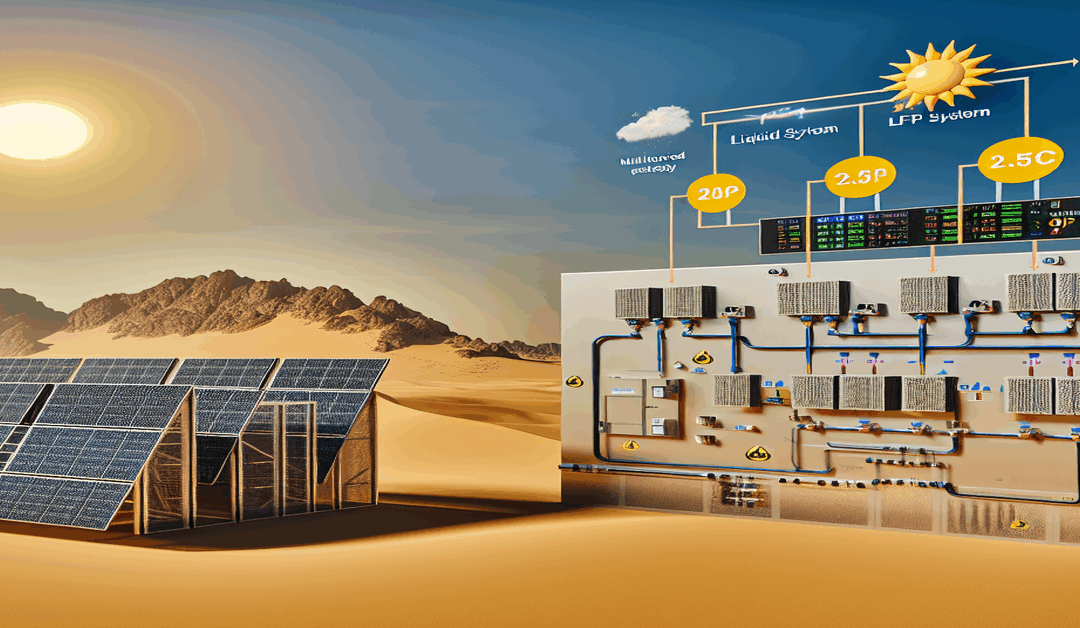Predictive Analytics: The Key to Optimizing Battery Performance in MEA’s Extreme Conditions
The Middle East and Africa (MEA) region is known for its harsh climatic conditions, posing significant challenges for battery energy storage systems (BESS). With temperatures soaring above 50°C and frequent dust storms, maintaining optimal battery performance and efficiency is crucial for the success of renewable energy projects in the region. This is where Jinko ESS’s SunTera stands out, leveraging the power of **predictive analytics** to ensure **>85% round-trip efficiency (RTE)** at Medium/High Voltage connection points, even in MEA’s extreme environments[1].
The Core of SunTera: Advanced LFP Batteries and Modular Design
At the heart of SunTera lies its state-of-the-art **LFP Batteries**, featuring 314Ah Lithium Iron Phosphate cells[1]. These cells are renowned for their stability, safety, and long cycle life, making them an ideal choice for BESS applications. To maintain optimal operating conditions, SunTera employs a sophisticated liquid cooling system that keeps the cells within a tight **±2.5°C thermal control** range[1]. This precise temperature regulation is essential for maximizing battery performance and longevity in the face of MEA’s extreme heat.
SunTera’s **Modular Design** is another key aspect that sets it apart. The scalable architecture allows for flexible deployment in remote and off-grid applications across the MEA region[1]. This adaptability is crucial for meeting the diverse energy storage needs of the region, from small-scale rural electrification projects to large-scale utility applications.
Harnessing the Power of Predictive Analytics
What truly distinguishes SunTera is its implementation of **predictive analytics**. By continuously monitoring vital parameters such as State of Charge, State of Health, voltage, current, and temperature in real-time[1], the system gains valuable insights into battery performance and health. This **Real-Time Monitoring** forms the foundation for SunTera’s proactive approach to maintenance and optimization.
Sophisticated algorithms within SunTera’s analytics engine are designed to detect anomalies and potential issues at an early stage. By identifying these warning signs, the system can schedule **Proactive Maintenance** interventions before critical failures occur[1]. This predictive approach minimizes downtime, reduces maintenance costs, and ensures the BESS remains operational when it matters most.
SunTera’s predictive analytics also plays a crucial role in **Degradation Management**. By optimizing charge-discharge profiles based on real-time data and historical trends, the system effectively mitigates battery degradation. As a result, SunTera maintains an impressive **>94% State of Health** even after 2,000 cycles[1], extending the lifespan of the BESS and maximizing its value over time.
Driving Economic Benefits and Grid Optimization
The economic benefits of SunTera’s predictive analytics are significant. By minimizing the need for site interventions through **Proactive Maintenance**, the system substantially reduces operating expenses (OPEX)[1]. This cost reduction is particularly valuable in the MEA region, where the remoteness of many installations can make maintenance visits both time-consuming and expensive.
Moreover, SunTera’s advanced analytics enable enhanced **Grid Optimization**. By intelligently managing energy storage and dispatch, the system facilitates the integration of renewable energy sources and helps manage peak loads[1]. This optimization not only improves grid stability but also reduces the total cost of ownership for BESS deployments in the region.
Prioritizing Safety and Compliance in MEA’s Challenging Environment
Safety and compliance are paramount in the MEA region, given the harsh environmental conditions. SunTera addresses these concerns through a multi-layered protection approach. The system incorporates gas and smoke detection, fire suppression, and insulation monitoring[1], all tailored to withstand the region’s dust storms and temperature extremes. These safety measures ensure the reliability and longevity of the BESS, even in the most challenging conditions.
The Future of BESS in MEA: AI-Driven Analytics and Modular Scalability
As the MEA region continues to invest in renewable energy infrastructure, the demand for reliable and efficient BESS solutions will only grow. SunTera’s **AI-driven analytics** and **modular scalability** position it as a critical solution for meeting this demand[1][4]. By optimizing battery performance, reducing costs, and enhancing safety, SunTera is poised to play a vital role in the region’s sustainable energy future.
In conclusion, SunTera by Jinko ESS showcases the transformative potential of predictive analytics in optimizing battery performance in MEA’s extreme conditions. By combining advanced LFP batteries, modular design, and AI-powered analytics, SunTera sets a new standard for BESS efficiency, reliability, and safety. As the region embraces renewable energy, solutions like SunTera will be essential for ensuring the success and sustainability of these initiatives.
#PredictiveAnalytics #BatteryPerformance #RenewableEnergy #MEA
-> Original article and inspiration provided by SolarQuarter
-> Connect with one of our AI Strategists today at ReviewAgent.ai

